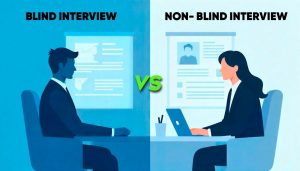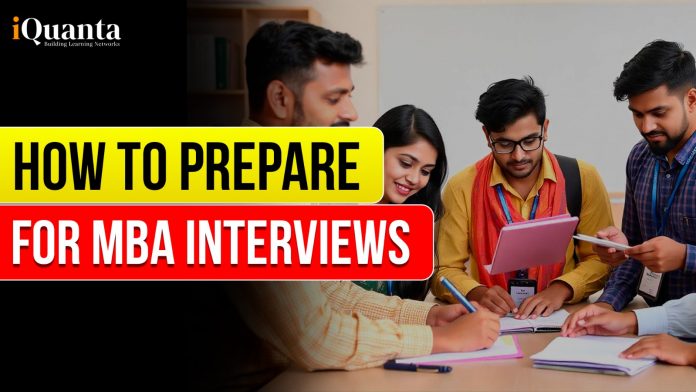MBA interviews play a very crucial role in securing admission into a top B-Schools . Candidates who qualify for the cutoff will get calls from various B-schools to appear for the Personal interview round. B-schools conduct MBA interviews to assess the leadership potential, communication skills, personality of the candidate, and their overall fit for the program. Candidates can check out this blog to learn more about MBA interview preparation, the various types and formats of these interviews, tips, and tricks to ace the interview, and various qualities seen by panellists in the candidates.

Join the GDPI course by iQuanta which has produced 500+ 99 percentilers in CAT 2024 and prepare for your MBA journey ahead.
Why are MBA interviews important?
MBA interviews are very crucial for the candidates, as they provide a chance for candidates to show their personality, communication skills, critical thinking abilities, and overall fit for the program. This will help the penellists to assess the potential contribution of candidates to the MBA community and make effective decisions accordingly.
The interview allows the admission team to gauge the interest of candidates in the program. Understand how much thought have they put into “Why do they want to do”, “what they want to do”. Many applicants submit the applications just because they have an interest, so they would rather give the opportunity to someone who is actually interested in attending. The interview is basically a conversational discussion where the admission team assesses the candidate’s interest in the program. They also look for individuals who have feasible goals. Business schools open many doors but it doesn’t open every door and the business schools are looking to admit individuals who have ambitious but also realistic goals.
Type of MBA interviews
MBA interviews of every B-school can be different, mostly the interviews are 40-45 minutes long. During the interviews, the panellists can ask many questions to candidates related to their application. Candidates will most likely be asked about 1-2 examples from their essays/resumes, where the interviewers are interested in how they overcome problems, what personality traits they demonstrated on those occasions, and what influence they had, among other things.
Every B-school can have a different format for an MBA interview. Some B-schools prefer Physical interviews however, some prefer video interviews. Some different format of interviews are:
- Face-to-face interview
- Virtual interview
- Behavioral interview
- Team-based interview
- Video interview

Other than these formats, business schools also have blind and non-blind interviews. In the case of non-blind interviews, the interviewers will have studied the application of the candidate before their interview, so the expected questions can be specific to their profile. However, in a blind MBA interview, the interviewer may know only the basic details of the candidate but may not know much more about their profile. So, candidates can expect more behavioral questions here.
Understanding the purpose of MBA Interviews
Before going for an interview it is essential for the candidates to be familiar with the type of things the interviewer looking for in a candidate.
- Clarity of Goal: the admission team wants to see the clear vision of the candidates and how an MBA fits in that.
- Fit with the program: The admission team will asses whether the values, personality of the candidates are aligned with the B-school or not.
- Leadership and interpersonal skills: The admission committee also checks how the candidate can collaborate with the team.
- Academic and professional background: The committee also checks the academic and professional background of the candidates whether they fit for an MBA.
- Motivation and commitment: The passion and genuine interest of the candidate attract the admission committee.
How to Prepare for MBA Interviews
Research the program thoroughly:
Candidates should be familiar with the curriculum of the program, faculty, and clubs which will highlight that you are genuinely interested in this program. Also, they can connect with alumni who can give inside reports of the institute.
Reflect on your personal and professional journey:
Candidates should be ready to answer about their short-term and long-term and how MBA will help in achieving that.
Prepare some frequently asked common questions:
Candidates should prepare some frequently asked questions that:
- Tell me about yourself
- Why did you choose this B-school?
- What are your strengths and weaknesses?
- Describe a leadership experience
- What are your short-term and long-term goals?
- How will you contribute to the program?
Master the art of storytelling
Candidates should use the STAR framework to answer the questions.
S- Situation
T- Task
A- Action
R- Result
Practice mock interviews:
Candidates must practice more and more mocks before giving the actual interview as by this candidates can be more familiar with the real-time interview situation.

Strong communication skills:
Candidates should have very good communication skills as communication is key to starting a conversation. Candidates should maintain eye contact, and smile while giving an answer. They should avoid any jargon and answer the question with clarity.
Stay updated with current affairs:
Candidates should be updated with current affairs as the interviewer can ask questions related to the current situation also. They should read newspapers, business magazines, and industry reports on a daily basis.
Common Challenges of MBA Interview
| Challenge | Solution |
| Nervousness | Practice mindfulness or deep breathing exercises to calm your nerves. Remind yourself it’s a two-way process. |
| Lack of Clarity | Ask for clarification if a question confuses you rather than guessing or giving an unrelated answer. |
| Unfamiliar Questions | Stay composed, think aloud, and showcase your problem-solving approach to handle unexpected queries. |
Join GDPI Course by iQuanta





